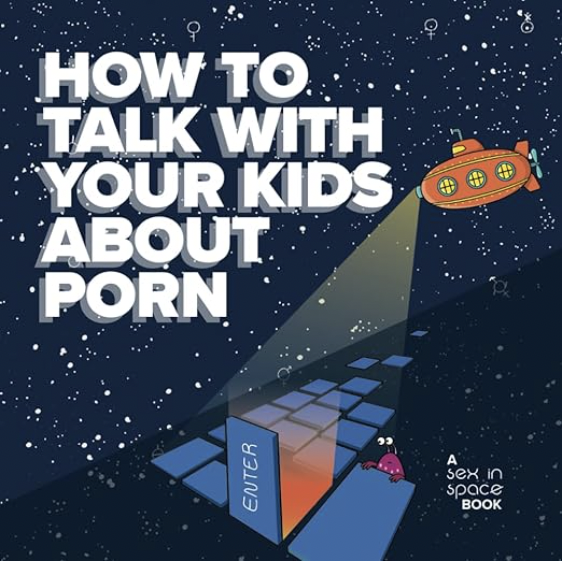Pornography. It’s a topic that can make any parent squirm, and that’s fair enough as it’s a hard topic to talk about, and being a parent is challenging. As our children grow up in a world where access to explicit content is just a few clicks away, it’s essential for us to confront the myths surrounding pornography and have open, honest conversations with our kids about its dangers.
I wrote a blog here about how to explain what pornography is to your pre-teen
So, let's talk about some common myths that might be stopping all of us from having these important conversations.
Myth #1:
"My kids are good, so they wouldn't want to watch it."
Curiosity is a natural part of growing up, and pornography is easily accessible online. Even good kids can stumble upon explicit content out of curiosity, or can be shown pornography, and influenced by their peers.
Myth #2:
"Technology moves too fast for me to keep up."
While it's true that technology evolves rapidly, our role as parents isn't to master every app or website. Instead, it's about being educated, understanding the risks, guiding our kids to make safe choices and to have healthy and respectful relationships. In other words, to keep them happy, healthy, and safe.
Myth #3:
"My child is too young for me to worry."
The average age kids encounter digital devices is getting younger. From toddlers watching YouTube to pre-schoolers using tablets, it's never too early to start thinking about how our kids may see pornography.
Myth #4
"Internet filters will keep my child safe."
Filters and parental controls are helpful tools, but they're not foolproof. Kids can still be exposed to explicit content through friends' devices, public Wi-Fi, or by bypassing filters.
Myth #5
"Preventing access will keep my child safe."
Banning and blocking everything isn't a practical solution. Kids will find ways to access content, and overly restrictive measures can lead to secretive behaviour. You want to be an askable parent, and they will not want to tell you if they think that they will get in trouble.
Myth #6
"The Internet is harmful full stop"
The Internet has the potential to enrich our lives by fostering connections between people, providing educational opportunities, and offering new platforms for artistic expression and learning. Encouraging children to utilise digital devices constructively while establishing boundaries to shield them from harmful content is key.
Myth #7
"Talking about pornography will encourage experimentation."
On the contrary, open dialogue about pornography empowers kids to make informed choices and to seek guidance from trusted adults. Ignoring the issue won't make it go away—quite the opposite.
Myth #8
"It's too uncomfortable to talk about."
Yes, discussing pornography can be awkward, but our discomfort shouldn't prevent us from protecting our children. Creating a shame-free environment where questions are welcomed can prevent risky experimentation and ongoing conversations. Remember that the conversations get easier to have once you move on from the first one.
There are many blogs that I have written about how to navigate and equip our children about the dangers of pornography here.
Today I wanted you to focus on a new parenting book:

'How To Talk With Your Kids About Porn': A Sex In Space Book by Dr. Jane Cherrington.
It’s a non-judgmental, shame-free guide supporting parents and caregivers navigating essential conversations about pornography.
Final Words
Debunking myths about pornography is essential for equipping our kids with the knowledge and skills to navigate pornography. By initiating open, non-judgmental conversations and providing guidance, we can empower our children to make wise choices and develop healthy relationships with technology and sexuality. It’s not about monitoring their every move—it’s about mentoring them to thrive in a digital world while safeguarding their well-being.
When parents feel overwhelmed and powerless, those feelings can impact our children. We want to foster an environment where both parents and kids feel educated, confident, and empowered to make informed decisions. Instead of focusing solely on the dangers and attempting to shut them out, we can educate ourselves about sexual health topics and technology and use this knowledge to parent from a place of confidence and positivity.
Ultimately, it’s about mentoring our children rather than constantly monitoring or micromanaging their online activities. Creating open, shame-free spaces for discussions about topics like online pornography can help safeguard our children and guide them toward responsible choices, being safe and healthy.
Let’s start the conversations today about pornography and not let the myths hold us back.
Other books include:

Learning about Pornography
This book is part of the Christian Birds and Bees by the Book series written by Patricia Weerakon for kids aged 7 to 10.

Someone Should Have Told Me
It’s a different world out there and kids are more vulnerable to online and offline dangers now more than ever. With Someone Should Have Told Me, adults can talk to kids about these dangers and empower them with essential information that will keep them and their peers safer.

How to Talk to Your Kids about Pornography
Our kids are being exposed to pornography at an alarmingly early age. No matter how careful we are and how much parental control we have on their devices, there will always be a risk. This is why it’s important to educate them about pornography from an early age.



